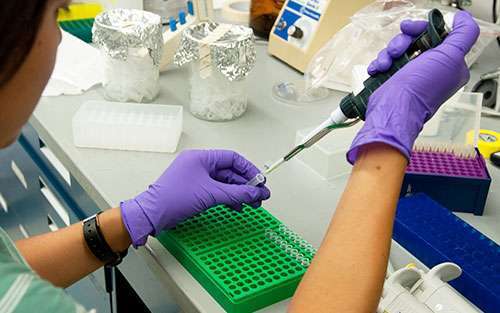

Christopher Vakoc, MD, PhD
One of the biggest challenges faced by scientists trying to solve lingering mysteries about the biology of pancreatic cancer is devising strategies to accurately mimic human disease progression in a laboratory setting.
A collaborative all-star team of pancreatic cancer researchers, including several PanCAN grantees and advisers, recently published a study utilizing a cutting-edge technology called organoids to shed light on one of those mysteries – what makes cells metastasize (spread) away from the primary pancreatic tumor.
The two corresponding authors for the paper published in Cell are David Tuveson, MD, PhD, who received one of our first research grants and is a member of our Emeritus Scientific and Medical Advisory Board, and Christopher Vakoc, MD, PhD, recipient of the 2016 The Daniel and Janet Mordecai Foundation – Career Development Award, which is cited as a funding source for the study.

David Tuveson, MD, PhD
The researchers, along with colleagues at their institution, Cold Spring Harbor Laboratory, and elsewhere, utilize three-dimensional balls of pancreatic cancer cells, known as organoids, to offer clues to how the cells metastasize. Comparing organoids composed of normal pancreas cells, precancerous cells, cells from an early-stage tumor and metastatic cells revealed major differences in certain regions in metastatic cells’ DNA.
“The regions, called ‘enhancers,’ regulate turning DNA into proteins, the workhorses of the cells,” explained Lynn Matrisian, PhD, MBA, chief science officer at the Pancreatic Cancer Action Network.
“The researchers’ data suggest that these enhancer regions are especially active in the metastatic cells, which leads to expression of numerous proteins that tell the cells to behave abnormally – depart the tumor, survive in the bloodstream and set up shop elsewhere in the body.”
Specifically, Tuveson and Vakoc and colleagues discovered that a protein called FOXA1, which is typically only present in early embryonic cells, is reactivated and plays a critical role in metastatic pancreatic cancer cells.
Matrisian added, “Findings like those reported by Drs. Tuveson and Vakoc are deeply important for us to make progress against pancreatic cancer. We cannot discover new early detection methods or improved treatment options without understanding the fundamental biology of the cancer cells.”





